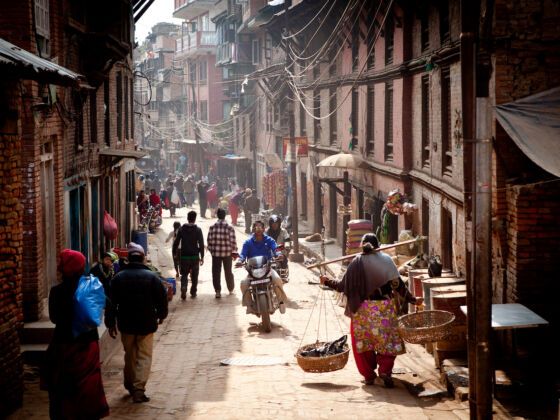I fought climate change in Nepal and I lost. Every day, I wore a mask. I coughed at busy intersections as motorcycles spit up dirt and dust as I passed them. I often got caught riding my scooter behind a government-owned bus that spewed large clouds of black smoke in my face. At night, vehicle lights magnified the dust clouds in the downtown area — they’ve become part of the Nepal experience. Citizens are accepting this as a part of daily life, but they shouldn’t be.

I Used to Live in Kathmandu, Here's My Plea for Climate Action in Nepal
After a year of living in Kathmandu, I developed breathing problems, as did my business partner. On a few occasions, we had to visit the emergency room for them. The doctors told us to avoid running and to track pollution levels. They said to wear a mask and to get out of Kathmandu to experience more breathable spaces. These were all short term solutions to a longer term problem.
Nepal is a magical place, but we can’t overlook its environmental issues.
The World Economic Forum’s Environmental Performance Index ranked Nepal 177 out of 180 for air quality in 2016 — only China, India and Bangladesh fell behind it. According to the Climate Action Programme, air pollution in Nepal is 9 times worse than a standard set by the World Health Organization. This month, the government of Nepal banned the use of vehicles older than 20 years to combat this rising problem. Yet what I learned in Nepal is that creating laws is not the issue, it is rather enforcing them.
There is a multitude of factors that contribute to the poor environment conditions in Nepal. Here are a few that stood out to me while I was living there.
Unstable governments are struggling to enforce regulations that improve Nepal’s air quality.
When I lived in Nepal, political leadership changed twice. Deputies to the Minister of Environment would take part in acts of corruption. I saw it first hand. There were very few government-run infrastructure projects ongoing. Most of it was run by the foreign aid community. There weren’t any vehicle inspections, which contributed to all the black smoke spewing out of the government-run buses. I can’t remember a time when the government of Nepal has been stable. Even before the 1998 civil war broke out and lasted a decade, the country has been divided and unsure about its future. This has complicated the government’s ability to address environmental concerns.
In the aftermath of the 2015 earthquake, Nepal has been struggling to develop.
Billions of dollars in infrastructure was lost to the recent earthquake and hundreds of thousands of buildings were destroyed. A fragile Nepal is now even more fragile. This historic catastrophe set the country back. It made addressing environmental concerns an afterthought. Communities needed to focus on more basic needs such as food, water, and shelter. We can look at recent policy changes, such as the banning of 20+-year-old vehicles, as a sign of progress. Yet we shouldn’t overlook how the earthquake affects the environmental progress timeline.
Climate action depends on infrastructure improvement, which requires serious investment and strategy.
There are hundreds of coal-burning brick kilns in Nepal. It is a major source of pollution for the country. Roads can’t be built fast enough to keep up with population growth. For Nepal to get cleaner, it has to get investment for infrastructure improvements. It has to think strategically about how those improvements impact the environment. The challenge is that individuals experiencing poverty are normally short term thinkers. Nepal is the second poorest country in Asia. A lot of political decisions don’t prioritize environmental impact. It is more about how it impacts short-term finances and political outcomes.
I love Kathmandu, but it is changing. It’s dirty. It’s getting harder to breathe. I fear that Nepal will continue to neglect its environmental issues. I fear that this is the consequence of being one of the poorest countries in the world. I fear that other matters take precedence. But pollution is killing its citizens. It is contributing to climate change. Something must be done. What tourist in the years ahead will compromise their respiratory health to see Nepal? I now think twice, will you?